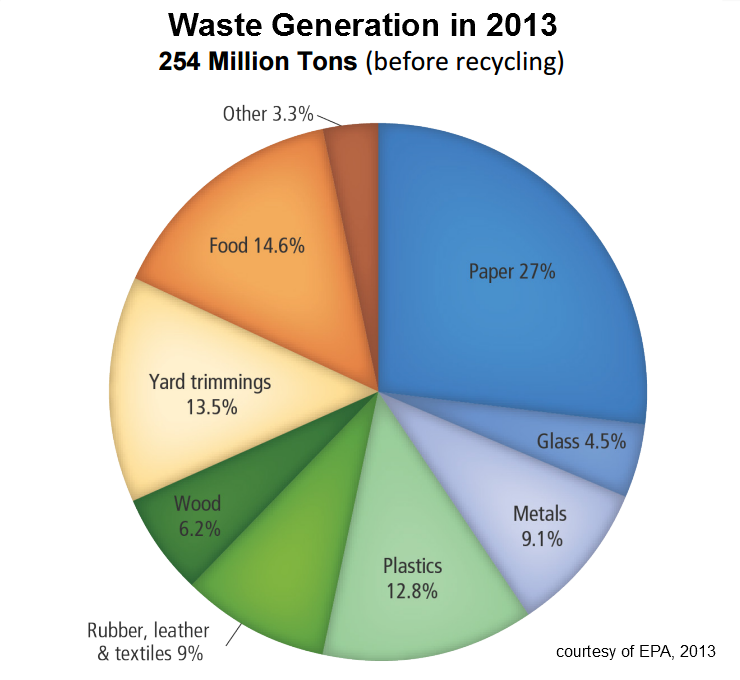Residential Composting: At Home and Educational Materials
Compost is organic material that can be added to soil to help plants grow. Food scraps and yard waste currently make up 20 to 30 percent of what we throw away, but they could be composted instead. Making compost keeps these materials out of landfills where they take up space and release methane, a potent greenhouse gas.

Benefits of Compost
The use of compost is beneficial in many ways.
- Improves soil structure
- Improves water holding capacity
- Modifies and stabilizes pH
- Increases Cation Exchange Capacity
- Provides nutrients
- Provides soil biota
- Suppresses plant diseases
- Binds or degrades contaminants
Visit the US Composting Council to learn many more benefits!
How do I get started
All composting requires four basic ingredients:
- Browns - This includes materials such as dead leaves, branches, and twigs.
- Greens - This includes materials such as grass clippings, vegetable waste, fruit scraps, and coffee grounds.
- Water – Composting organisms need a moist environment.
- Air – Air circulation in the pile will allow the composting organisms the oxygen they need to live and keep the pile from producing a foul odor.
Basic Instructions
- Find an area of your yard that gets at least five hours of sunlight per day for best results. (You can compost in the shade, but it takes a bit longer.)
- Make or purchase a composting bin to place in your chosen area. A wire ring of chicken wire works just fine, as does a simple pile.
- Find a container with a lid to store your kitchen waste.
- Fill the container with your kitchen waste.
- Accumulate a large pile of brown leaves or other high carbon material like sawdust to put in your composting bin.
- Moisten the leaves to the consistency of a wrung-out sponge.
- Periodically, stir the contents of your kitchen-waste container into the pile of leaves.
- After about one month to 6-weeks, check the bottom of the pile to look for finished compost -- it will look like mulch and smell like “fresh, good soil.” You can use it immediately as mulch around plants. If you want to use it as a soil amendment, it is best to sift the large chunks out and let it mature a month or so first.
What Can I Put In My Compost?
Just about any kitchen or yard waste can go into your backyard compost. Dry leaves, shredded newspaper and soiled napkins can also be mixed into the bin. Always cover food waste with leaves, weeds, or paper to avoid attracting bugs.
YES! COMPOST KITCHEN & YARD WASTE & OTHER DRY MATERIALS
| cores/peelings | pasta | grass/hedge clippings | twigs | pet hair |
| coffee grounds | rice | houseplant cuttings | weeds | real wood ashes |
| egg shells | stale bread | leaves | sawdust | shredded, dry leaves |
| fruits | tea bags | pine needles | natural-fiber | newspaper |
| nut shells | vegetables | sod | dryer lint | |
| paper filters | flowers | straw | paper towel tubes |
NO! Do NOT Compost
| bones | dairy products | grease | meat | mature weeds (with seeds) |
| fish | whole egg | pet wastes | oils/fats | diseased/insect-infested plants |
Educational Materials
If you are a teacher, the US Composting Council and the National Agriculture in the Classroom have several resources that you can use to educate your students on composting.
Grasscycling
If you think you don’t have time or space to compost, consider reducing the amount of organics going to landfills by grasscycling. Grasscycling is the act of allowing grass clippings to remain on the lawn after mowing to return nutrients back to the soil. The Town of Collierville has produced an excellent video with guidance on this topic.
Other Relevant Information
Cornell University's Waste Management Institute also has lots of resources for small-scale composting.
Institute for Local Self-Reliance developed a guide for local governments interested in starting their own programs called Yes! In My Backyard: A Composting Guide for Local Government as well as a guide for community composting called Growing Local Fertility: A Guide to Community Composting.
If you can’t compost at home, visit findacomposter.com to find a composter in your area that will accept your material.
| Contacts |
|---|
| Robert Wadley 615-741-4907 Robert.Wadley@tn.gov |
This Page Last Updated: June 28, 2024 at 8:30 PM